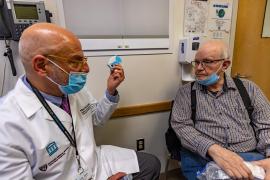Congress Adjourns Without Approving Ryan White CARE Act Reauthorization
Congress on Saturday adjourned without the Senate passing a measure to reauthorize the Ryan White CARE Act, which provides funding for HIV/AIDS programs in the U.S., the AP/Boston Globe reports (Abrams, AP/Boston Globe, 10/1). Five senators, including a "handful" from New Jersey and New York, on Friday blocked Senate consideration of a House-approved bill (HR 6143) sponsored by Rep. Mary Bono (R-Calif.) that would change CARE Act funding formulas so that rural areas experiencing increasing numbers of HIV/AIDS cases receive increased funding amounts, which would decrease funding allocated to urban areas (AP/Long Island Newsday, 9/29). The government will allocate about $2 billion for CARE Act programs in fiscal year 2006. The bill -- which the House on Thursday voted 325-98 to pass -- would authorize funding increases of 3.7% annually from 2008 through 2011. Bono's bill also would require that 75% of CARE Act funds be used for "core medical services," while remaining funds would be allocated for care-related services. Some legislators from states with large urban areas -- including California, New Jersey and New York -- have opposed measures that would change CARE Act funding formulas, saying they could harm HIV/AIDS programs in areas with higher HIV prevalence (Kaiser Daily HIV/AIDS Report, 9/29). According to Sen. Mike Enzi (R-Wyo.), who sponsored the legislation in the Senate, Sens. Dianne Feinstein (D-Calif.) and Barbara Boxer (D-Calif.) on Friday dropped their opposition to the legislation after being assured that California would not be excessively harmed under the new funding formulas, the San Francisco Chronicle reports. However, Sen. Hillary Rodham Clinton (D-N.Y.) continued her hold on the legislation, saying, "A bill that devastates the ability of high-prevalence communities to deal with cases is unacceptable" (Epstein, San Francisco Chronicle, 9/30). She added, "You want to take money away from my 100,000 people living with HIV/AIDS and give it to worthy people in other parts of the country because this administration and this Congress won't put more money into funding treatment programs for HIV and AIDS" (AP/Long Island Newsday, 9/29). Congress could consider the legislation when it reconvenes after the November elections, but some sponsors of the legislation say CARE Act funding is running out in some parts of the country (San Francisco Chronicle, 9/30).
This is part of the Morning Briefing, a summary of health policy coverage from major news organizations. Sign up for an email subscription.





